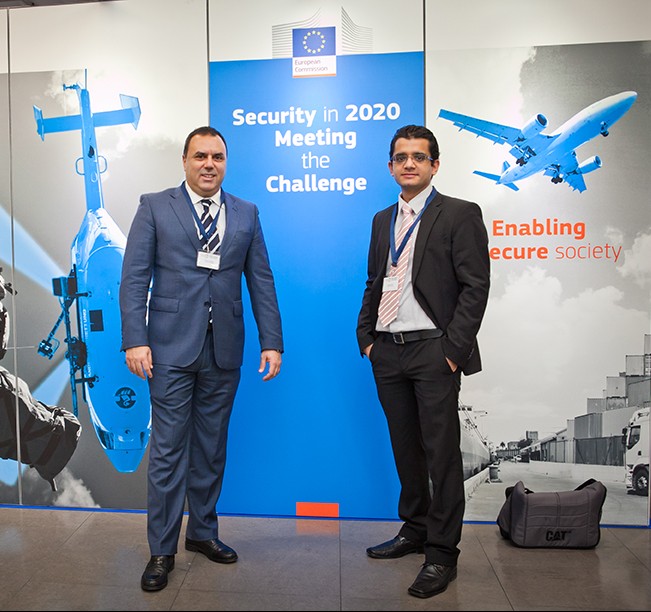Botond Szebeny, Jean-Paul Forceville, David Pilkington, Antonino Scribellito and Waqas Ahsen at PostEurop describe their work to tackle postal operators’ security challenges
Can you tell us about the collaboration at PostEurop, and how important this collaboration is from a postal security perspective?
Botond Szebeny – Secretary General, PostEurop: The main tasks of PostEurop always involve promoting cooperation, innovation and bringing added value for our members; this is deeply ingrained in the Association’s strategy and goals. Through many different committees, working groups and transversals, we are able to establish a connection between all the postal operators in Europe. In this sense of connection and unity, the security and customs transversal of PostEurop plays an important role in order to make our members share their best practices to better reinforce security in Europe. For this, we also have a dedicated working group within the Security & Customs Transversal (SCT), which works closely with the European Commission to ensure that legislation is properly improved and implemented, with particular regard to the new European Union Customs Code. All of this is also supported by the framework of our European Projects department, within the SAFEPOST Project.
In your opinion, what are the emerging challenges facing the postal industry in general, and how will they affect the area of postal security?
Jean-Paul Forceville – Chairman, PostEurop: In my personal view, unfortunately it is extremely difficult to predict with 100% accuracy the upcoming challenges to postal security. However, as the postal industry moves towards a more digitalised area, related to new e-services and markets, I can only assume that one of the biggest challenges will be related to cyber security and how we can protect our clients and citizens. In any case, a constant challenge that we are facing every day is how to secure and protect the integrity of our supply chains. This is an exercise that will always be under constant scrutiny, as new and more dangerous criminal practices are appearing daily, linked, for example to terrorism, counterfeiting, drugs and weapons. As postal operators in Europe, we need to keep this fruitful collaboration among operators, in order to better guarantee Europe’s safety.
In your position as Chair of PostEurop’s Security and Customs transversal and as the Royal Mail’s lead on customs issues you are ideally situated to understand the challenges ahead for postal operators. What in your opinion are the current challenges for Royal Mail in security and customs, and what are your views on the importance of having these two areas linked together?
David Pilkington – Chairman, PostEurop Security and Customs transversal: There are numerous challenges for Royal Mail Group, as a designated postal operator, many of which are common to all postal operators. The biggest and most urgent challenge for the postal sector is the requirement to provide electronic data, in advance, for customs and aviation security purposes driven by legislative changes and the emerging market environment. There are many new and emerging pieces of legislation coming forward from across the globe that will radically change the landscape for postal operators and their customers. An example of this is the UCC requirement for postal operators to provide advance electronic data to improve security and facilitate import customs processes by 2020. This timeframe is also reflected in the Universal Postal Union’s EAD roadmap. Royal Mail Group is now integrating the Customs Declaration System (CDS) into its IT infrastructure and processes. We are doing this with the full cooperation of the UPU’s technology department, our UPU partners and the UK Border Force (BF) and Her Majesty’s Revenue and Customs (HMRC), to help meet these legal requirements and allow us to serve our customers better. We shouldn’t underestimate the scale of this task; postal operators will have to implement new IT systems, migrate customer to new data driven products, and achieve all this globally by 2020!
The security environment is more challenging and constantly changing. Postal operators, through our work in the security and customs group, are focusing on: Ensuring we achieve exact security standards for the physical security of our mail centres; ensuring PostEurop members are taking action to mitigate risks to their IT systems from cybercrime; and combating abuse of the postal network. Recently, we have experienced an increase in fraudulent postings and mail scams. Our customers’ safety will always be a priority for us, thus fighting against the rise of fraudulent mail volumes has become a new focus for our security and customs team. That is exactly why, together with PostEurop, we are developing a strategy that will be able not only to raise awareness amongst the many operators in Europe (and globally), but also be able to implement the necessary counter measures to tackle this issue.
The protection of national borders and the facilitation of legitimate trade is a key part of the work postal operators do in partnership with security and customs agencies. The dual use of data (security and customs clearance) will enable postal operators and other agencies to use new technologies to further improve the security of our mail streams, protect borders, our staff and our customers. We have already recognised that these two areas are interlinked and it’s important we ensure this continues, structurally and through our actions.
Has the SAFEPOST project resulted in a concrete product or service?
Antonino Scribellito – Senior Project Manager, PostEurop & Waqas Ahsen – Assistant Project Manager, PostEurop: The SAFEPOST Project resulted in a concrete prototype called “D-Tube”. The D-Tube electronic nose prototype – which was developed by Swedish company Tellusecurein cooperation with FOI and UNIGE – is an excellent screening and decision system to detect and remove anomalies based on gas chromatography, gamma detection, laser Raman spectroscopy and image recognition. The key aim is to have a prototype which did not exist in the market before, realised and fit perfectly in the postal sorting centre, in order to avoid slowing down the flow, as well as to detect narcotics and explosives in the monitored postal service environment. This also applies for customs detection and law enforcement needs.
Additionally, regarding the other technological solutions produced by SAFEPOST Project, such as European Union Common Postal Security Space (EU Parcels Schengen Space), all postal operators (small, medium and big) are willing to support customs and law enforcement agencies using the European Postal Security Stamp (EPSS) for the following advances:
- Enhanced efficiency arising from increased availability of information;
- Capacity to manage higher demands for security;
- The ability to upgrade security against theft, explosives and ammunition, weapons, hazardous materials, smuggling, drug trafficking, money-laundering and (low-budget) terrorism;
- Ability to match postal security measures to national threat levels.
The EPSS information input will be used for shipment targeting and the selection of appropriate screening techniques at downstream security control points. The security stamp data will include inspection results and description of applied techniques. Data captured will include:
- Date, time and place of inspection;
- Applied inspection methods;
- Prints and reports of inspection results (including images, and D-tube outcome);
- Risk Assessment.
The EPSS represents potentially the greatest opportunity for innovation and eventual exploitation as a result of the work of the SAFEPOST project, while at the same time posing many challenges of harmonisation, standardisation and data sharing. Thus, there are three recommendations, which result from extensive analysis of the opportunity presented by the EPSS. They are as follows:
1. Continued and concerted efforts toward harmonisation, standardisation and mutual recognition of a consolidated and comprehensive European Postal Security Stamp (with the detailed data requirements agreed for implementation).
2. A European Union Horizon 2020 funded research project to develop the technology integration, data sharing and cooperation agreements and regulatory recommendations – this may actually need to be two projects, with one being directed toward technology integration and actual systems required for data sharing, and another to address the political, regulatory and cooperation agreement elements necessary in order to take full advantage of the EPSS and what it offers.
3. Small Horizon 2020 funded pilot projects to address the actual implementation of the EPSS integrated solution – these should encompass at least 10-15 of the European Union member states with perhaps two or more consortia tasked to address this on a Europe-wide scale.
Tel: +32 2773 1193
Please note: this is a commercial profile















